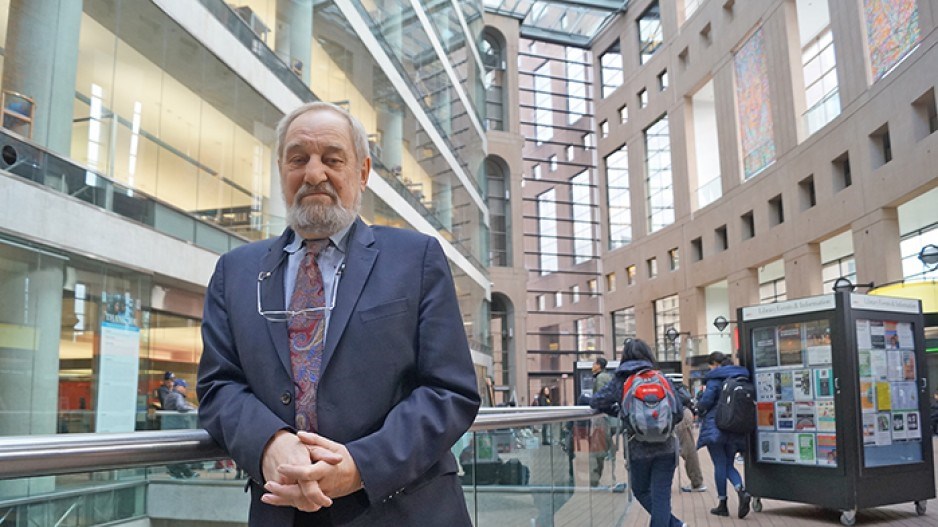Renowned international relations expert Jonathan Manthorpe says the deepening diplomatic crisis between Canada and China is a “gift” to Canada; one that should shine light on the often-overlooked “fundamental incompatibility” of values between the two countries.
Manthorpe, a former Hong Kong correspondent, Vancouver Sun columnist and Business in Vancouver contributor, is on a speaking tour for his new book Claws of the Panda. He spoke March 13 to a decidedly anti-Communist Party of China crowd hosted by the Vancouver-based society Friends of Hong Kong.
Claws of the Panda is an overview of Canada’s relationship with the authoritarian regime and the influence Beijing has on Canadian politicians and Canada’s Chinese diaspora. However, it was written before the arrest of Huawei chief financial officer Meng Wanzhou on December 1, 2018.
Manthorpe said the fallout from Meng’s arrest is the worst crisis in Canada-China relations since the two countries established mutual diplomatic relations in 1970.
Manthorpe drew chuckles when he expressed how “queasy” he got at recent political interference in the Meng case by former ambassador to China John McCallum. Equally worrisome for Canada’s upholding of the rule of law, he said, is the alleged interference by the Prime Minister’s Office in the possible prosecution of construction firm SNC-Lavalin for bribing the Libyan government.
On the whole, he said, there is a “gulf” between China’s civic, judicial and human rights values and those upheld by Canada domestically and internationally. One example, before Meng, was when Prime Minister Justin Trudeau went to China expecting to discuss trade and democratic values, only for Beijing to “send him packing with a flea in his ear.”
The Meng crisis should be “welcomed” and it should force scholars and naive politicians to re-examine Canada’s relationship with the authoritarian regime, he said.
“The first task is for Canadian policy and opinion makers is to realize the Huawei crisis is an opportunity to sweep away the self-delusion that has clouded their view of the People’s Republic of China few decades,” Manthorpe said.
Manthorpe prefaced his speech and Q&A session at the downtown Vancouver Public Library by noting that his research speaks to the authoritarian regime of the People’s Republic of China and not Canada’s 1.5-million-person ethnic Chinese diaspora. He acknowledged that speaking frankly about the subject locally is difficult given the social and cultural ties Canada, and especially Vancouver, has with China, Taiwan and especially Hong Kong, a city with about 300,000 Canadian passport holders.
He expressed disappointment after hearing about one person who did not want to attend his talk, fearing it would be an “anti-Chinese” event.
Manthorpe said raising legitimate issues about Canada-China relations usually provokes controversy.
“We saw it, for example, in the whole business of the investment in real estate in Vancouver and Toronto. We saw real estate agents rolling out the racism card,” he said, adding that Chinese government officials accused Canada of white supremacy after Meng’s arrest.
To maintain objectivity, Manthorpe said, he wrote his book entirely from the public record.
His book delves into, among other things, how agents of the authoritarian regime exert pressure on ethnic Chinese people overseas who have either personal or business ties to China.
China, he says, employs agents in Canada who meddle in local political affairs via organized, typically pro-business or “friendship” groups. Local politicians, he notes, are increasingly falling under the influence of those groups.
“These agents have been able to come over here and work with no pushback from Canadian authorities,” he said. “The fact that we have very similar campaigns in Australia and New Zealand as we have in Canada gives me great satisfaction that I’m not a conspiracy theorist.”
There is some hope of pushback within government, however, he said. Last May, in Vancouver, China’s propaganda wing, the United Front Work Department, organized the ninth Conference of the World Guangdong Community Federation, which saw over 200 Chinese nationals slated to attend the event denied visas. Premier John Horgan, MLA Teresa Wat, MP Alice Wong and Richmond Mayor Malcolm Brodie attended the conference, among others.
The United Front is reportedly used to quash dissent and stifle criticism of the Communist Party of China while promoting the party’s political goals, such as bringing Hong Kong and Taiwan into its grasp or undermining the liberal democratic order.
Manthorpe stressed Sino-Canadian relationships will likely need to be developed outside of government activity given the level of influence pro-Beijing groups are exerting on Canadian politicians.
He also called interference in local Chinese media “quite appalling,” noting a free exchange of ideas in the Mandarin-language press is fundamental.
Canadians, he said, should keep in mind the repressed minorities in China and those who are threatened and punished for speaking out against the Chinese government.




